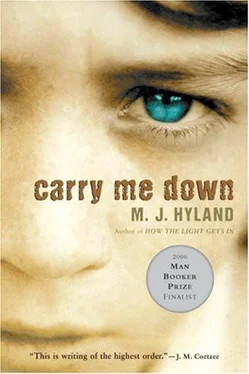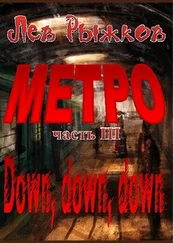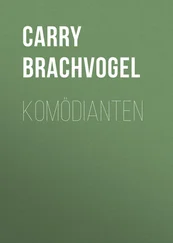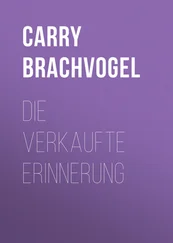‘What’s a hearing? Is that like a trial?’
‘Maybe we should talk more when we get you to your room.’
‘You’re the one that mentioned the hearing. I didn’t even ask.’
‘That’s true. I did bring it up. I’m sorry.’
The ambulance is parked downstairs outside the lift; one door is open, one closed. It says LANCE.
The social worker’s car is blue and the smell inside is like the smell of new shoes.
‘Right, so,’ he says. ‘The place I’m taking you might seem a bit scary at first, but it’s not a bad place, and everybody there will want to look after you and see that you are all right. I know you must be feeling a bit overwhelmed after what’s happened and maybe it won’t sink in until later.’
‘I’m not a baby,’ I say. ‘You don’t have to talk to me like I’m a baby.’
He shrugs and lets a truck overtake us.
‘Can I’ve a cigarette?’ I ask.
‘In the glovebox,’ he says.
I root around and find a packet of Silk Cut. ‘Matches?’
‘Use the car lighter,’ he says.
‘Oh yeah,’ I say.
I’m having fun. I shouldn’t be having fun. I want to stay in this car; keep driving; take the car on a ferry across to France or England and drive all the way to Switzerland and go on a funicular, then drive to the airport and fly to America. Keep driving for the hell of it. It’s warm in the car and there’s a tape playing.
‘I suppose this is jazz,’ I say.
‘Do you like it?’
‘Yeah.’
He nods, but doesn’t speak, and so we drive in silence while I smoke two cigarettes, lighting one from the other. As we get closer to the city I wind down the window and hang my head out like a dog does. I look out at the dark sky, and up at the fingernail moon, and I feel happy. When we turn into a big square near the statue of Parnell, I look at the lights in the windows of the big terrace houses and hope that I’ll be staying in one of them.
‘We’re here,’ says the social worker.
He points to a four-storey house with a blue front door, bars on the windows, and stone stairs leading down to a basement. There are lights on in all the windows and a Manchester United football jersey stuck to the inside of a window on the top floor.
‘Is this a boys’ home?’
‘Yes, it’s a boys’ home. Let’s get you inside and see if they have the bed ready yet.’
There is a room for me at the end of the long, dark hallway. We come to a yellow door with a brass number 84 on it and we go inside. The social worker turns on the light, which flickers for a moment before working. It’s a small room, with a round yellow rug — the same yellow as the paint on the door — in the middle of the floor, a narrow bed that is low to the ground, and there are racing cars on the wallpaper. The bed doesn’t look big enough for me and, although I prefer to sleep flat on my back, I’ll probably have to curl my legs up during the night.
‘So, this will be your room for a few days,’ says the social worker. ‘Leave your bag in the cupboard and come with me to the interview room.’
I sit on the tidy bed. It’s white, like a tablet, made tight, the sheets tucked in all the way under the thin mattress. There are three blankets in a neat pile on the end, orange, green and brown.
‘What for?’ I ask.
‘You’ll be interviewed by the housefather, just for a minute, and in the morning you’ll be back with the guards.’
‘I feel sick,’ I say.
‘That’s understandable,’ he says, as he fastens the button on his sleeve. ‘What’s happened is probably starting to sink in.’
‘No, it’s not. I just feel sick.’
‘All right, I’ll get you some aspirin, but we need to go. The housefather has got out of bed especially and we don’t want to keep him up all night.’
‘OK.’
The two guards who came to our flat are in the interview room and they sit in chairs against the back wall. The social worker pulls a chair out from the table and points at it. I sit at the table and then he disappears, or so I think, until I realise that he is standing behind me.
The room has nothing in it except the table, four chairs, a heater and some toys for small children: rings that fit over plastic sticks, and plastic shapes that fit into plastic holes. Somebody has tried to force a triangle into a square hole.
The housefather comes in. He is old and skinny, and he has messy black and grey hair. He sits opposite me at the table and holds a pen over a pad of writing paper.
‘Good evening, John,’ he says. ‘My name is Mr Keating.’
‘Hello,’ I say.
He hands me a key and tells me it’s for the cupboard in my room. The key must be made of plastic: it weighs no more than a cube of sugar. There are chocolate biscuits on the table but I don’t want them. I feel hungry and full all at once, like there’s too much air in my stomach.
Then we are silent and he looks at me. ‘You’re scratching your head quite a bit,’ he says. ‘Are you conscious of doing that?’
I wasn’t, but there’s no way now to hide the blood on my fingers.
‘Does that not hurt? Does it not hurt to make your scalp bleed?’
‘Not really. I just scratch because it’s itchy.’
‘There are better ways to stop an itch.’
I shrug.
‘Do you feel the pain now? In the place where your head is bleeding?’
‘No.’
He looks over at the social worker. ‘Would you like me to get you a tissue or some cotton wool?’
‘No. It doesn’t matter.’
More silence.
‘I hear you think of yourself as a bit of a lie detector? I hear you can tell when people are lying?’
‘Yes.’
‘I know a little of that subject myself. Did you know that there are other people in the world who can do this?’
‘Yes. I’ve read about them.’ I tell him a little of what I’ve read about the wizards, how they score between ninety and one hundred per cent in tests.
‘Did you know that most lie detectors develop their super-sensitivity to emotion early in life? And this heightened sensitivity is often due to unusual childhood circumstances?’
I enjoy being spoken to as though I am an intelligent adult, but I don’t get his point. ‘So?’ I say.
‘Well, John, many people who claim to have this ability to detect lies have extremely irritable mothers, or alcoholic fathers, or some other force or presence in their early life that is, or was, unhealthy, unnatural, unpleasant or extremely upsetting in some way. Does that ring any bells, John? Did you have an upsetting experience?’
He is wrong. ‘I feel sick,’ I say.
As I move to stand, the chair falls out from under me. And that is the last thing I remember of my first night in the Parnell Square Home for Boys.
* * *
When I wake, the social worker and the housefather are standing by my bed. The room is stuffy and, although it must be morning, the curtains haven’t been opened and it is still dark.
‘We came to wake you,’ says the social worker. ‘But you woke yourself. How did you sleep?’
‘Good,’ I say. ‘Fine.’
‘You’ve missed breakfast,’ says the housefather as he opens the curtains. ‘It’s eleven o’clock.’
I sit up and an insect lands on my face, and then on my arm. The room is hot and infested with midges. I’ve never seen midges inside. They shouldn’t be here.
‘Get dressed. We’ll wait outside.’
I dress in the same clothes I came in and go out into the hall.
The housefather folds his arms across his chest. I do the same. But I feel stupid, unfold them, and lean my shoulder against the door.
‘Your mother is coming for you later this afternoon. She came to get you at nine o’clock and was waiting for you but she didn’t want us to wake you. And your father will be here on the afternoon train, but first you need to come with us to the interview room. Then you’ll have some lunch.’
Читать дальше












